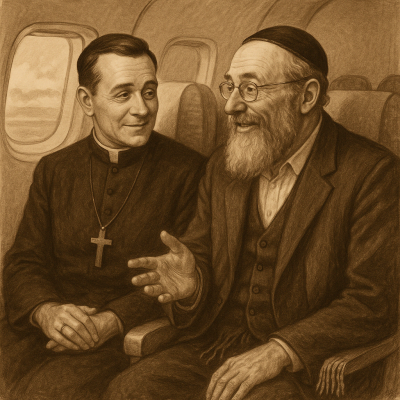It was a flight like so many others, where strangers sit side by side and time, suspended between departure and arrival, invites the unexpected. That was how a priest and a rabbi, men of faith from distinct traditions, found themselves sharing a journey through the skies.
For a while, they exchanged only polite words, like courteous seatmates. But the rabbi, gentle and curious, couldn’t resist:
— Father, I’ve long wanted to ask you something: is it difficult to become a priest?
The priest was surprised and replied with a smile:
— Don’t tell me you’re thinking about converting and becoming a preacher!
The rabbi chuckled:
— Not at all. I’m just curious to compare it with the formation of a rabbi, which is far from easy.
The priest then spoke of the years of seminary, the strict disciplines, the vows of chastity, obedience, and poverty. He described how a young man must pass through long stages of academic and spiritual formation before receiving the cassock. The rabbi nodded thoughtfully:
— I suspected as much. After all, our religions are siblings. Branches from the same tree.
— And what about becoming a bishop? — asked the rabbi.
The priest explained the requirements, the appointments, the recognition by peers.
— And an archbishop? A cardinal?
The priest described the journey – not ambition, but mission.
— And the Pope? How does one become the Pope?
There was now a sense of wonder in his voice.
— Ah, my friend… that is the work of the Holy Spirit. The Conclave. A choice made among cardinals. A unique calling. It is very, very difficult.
The rabbi fell silent for a moment, then smiled.
— Father, we just celebrated Passover. And you celebrated Easter. Twin holidays in their essence. So, allow me one last question.
The priest nodded, intrigued:
— And what is it?
— Becoming the Son of God… is that very difficult?
The priest was stunned. He sat straighter in his seat and took a breath:
— But Rabbi… the Son of God is unique!
To which the rabbi replied, with a twinkle in his eye:
— Exactly, Father. One of our boys, born in a manger… made it.
They both smiled, their eyes moist. As the plane began its descent, they embraced with emotion and wished each other: “Happy Easter” and “Chag Pessach Sameach.”
This small tale, once told by the sociologist William Carvalho, reminds us that life does not end; it transforms. And that Jews and Christians are not on opposing sides, but rather on the same sacred pages of history.
The Hebrew word “Pessach” (פסח) means passage. And Easter, too, is just that: a call to cross this life with less fear and more hope.
May this simple story, born among clouds and airplane seats, remind us that what unites us is far greater than what divides us. And perhaps the hardest thing of all is learning to love without conditions.
Happy Easter. Chag Pessach Sameach.


